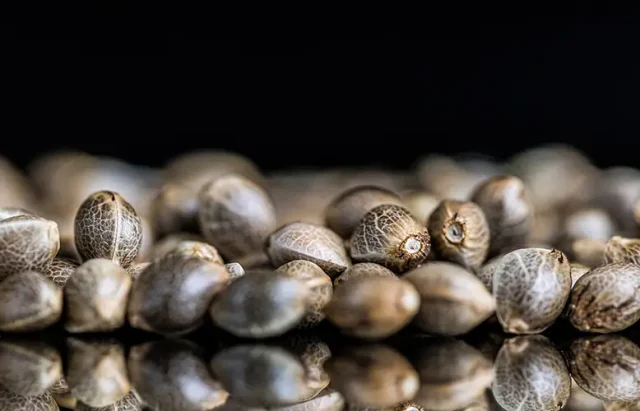
Choosing the right seed bank can feel like embarking on an epic treasure hunt without a map. With so many options out there, each claiming to offer the best seeds and top-notch service, it’s easy to get overwhelmed. Whether you’re a gardening guru or just dipping your toes into the green world, understanding the different kinds of seed banks and picking the one that suits you best is essential. Let’s journey through the vibrant landscape of seed banks, explore their various types, and uncover the secrets to making the perfect choice for your gardening dreams.
Understanding the Different Types of Seed Banks
Seed banks come in all shapes and sizes, each tailored to meet different needs and preferences. At their heart, seed banks are sanctuaries that store seeds to preserve plant diversity and ensure that future generations can access various plants. However, not all seed banks are created equal, and knowing the different types can help you make an informed decision.
Governments or large organizations often support public seed banks and focus on conserving many plant species. These institutions play a crucial role in maintaining genetic diversity, which is vital for agriculture and the stability of ecosystems. They serve as a repository for seeds worldwide, ensuring that rare and endangered plants are not lost to time. Public seed banks are typically accessible to researchers, farmers, and sometimes the general public, offering a treasure trove of seeds that might be hard to find elsewhere. Their extensive collections make them invaluable resources for anyone exploring various plants.
Private seed banks, on the other hand, are usually run by individuals or small companies. These seed banks often specialize in specific seeds, such as heirloom varieties, organic seeds, or seeds adapted to particular climates and regions. Private seed banks can offer more personalized service and specialized knowledge, making them a great choice for gardeners with particular interests or unique needs. For example, if you’re passionate about organic gardening, a private seed bank that focuses on organic seeds might provide the quality and variety you want. These seed banks often pride themselves on their curated selections, ensuring that every seed they offer meets high quality and sustainability standards.
Commercial seed banks operate as businesses, selling seeds to consumers on a large scale. These seed banks focus on providing seeds that are in high demand, such as those for popular vegetables, flowers, or herbs. They often boast extensive catalogs and user-friendly websites, making browsing and purchasing seeds easy. Commercial seed banks are adept at meeting the needs of a broad audience, from amateur gardeners to professional landscapers. They offer competitive pricing and frequent promotions, making high-quality seeds more accessible to everyone. Additionally, many commercial seed banks provide valuable resources like gardening tips, planting guides, and customer support to enhance the overall experience for their customers.
Community seed banks are grassroots initiatives that aim to support local agriculture and promote sustainable gardening practices.
These seed banks often operate within specific communities or regions, providing seeds well-suited to the local environment. They foster a sense of community among gardeners, encouraging the exchange of seeds and knowledge. Community seed banks are ideal for those who want to support local agriculture and connect with fellow gardening enthusiasts. They often host events, workshops, and seed swaps, creating a vibrant network of gardeners who share a common passion for growing their own food and flowers. By focusing on local needs and conditions, community seed banks help ensure that the seeds they provide are adapted to thrive in their specific environments, increasing the chances of successful cultivation.
Lastly, specialized seed banks focus on particular niches within the gardening world. These can include seed banks dedicated to medicinal plants, rare and exotic species, or even genetically modified seeds for specific traits. Specialized seed banks cater to enthusiasts looking for something beyond the usual offerings, providing seeds that might be difficult to find elsewhere. For instance, if you’re interested in growing medicinal herbs, a specialized seed bank can offer a curated selection of high-quality seeds tailored to your needs. These seed banks often serve as hubs of expertise, providing detailed information and support for growing their specialized plants.
Understanding these different types of seed banks is the first step in finding the one that best fits your needs. Each type offers unique benefits, whether it’s the vast selection of a public seed bank, the specialized offerings of a private seed bank, the convenience of a commercial seed bank, the community spirit of a community seed bank, or the unique selections of a specialized seed bank. By identifying what you value most in a seed bank, you can narrow your options and choose one that aligns with your gardening goals and preferences.
Evaluating Seed Bank Reputation and Reliability
When choosing a seed bank, reputation and reliability should be at the top of your checklist. After all, you want to ensure that the seeds you purchase are of high quality and that the seed bank will stand by its products. So, how do you evaluate a seed bank’s reputation and reliability effectively?
Start by diving into customer reviews and testimonials. A reputable seed bank will have a wealth of positive feedback from satisfied customers. Take your time to browse through independent platforms, such as gardening forums, social media groups, and review websites. Look for consistent praise for seed quality, timely delivery, and excellent customer service. Positive reviews can give you confidence that the seed bank is trustworthy and dependable. On the flip side, be wary of frequent complaints about poor seed germination rates, delayed shipments, or unresponsive customer support, as these can be red flags indicating potential issues with reliability.
Another crucial aspect is the seed bank’s affiliations and certifications. Reputable seed banks often hold certifications that attest to their quality standards, such as organic certifications or memberships in professional gardening associations. These certifications indicate that the seed bank adheres to certain seed production, handling, and distribution standards. Additionally, affiliations with well-known gardening organizations can lend credibility and assure you of the seed bank’s commitment to quality. Certifications and memberships demonstrate that the seed bank is serious about maintaining high standards and is recognized by industry authorities for its efforts.
Transparency is also a key factor in assessing reliability. A trustworthy seed bank will provide detailed information about their seeds, including the origin, variety, and growing conditions. They should clearly state their return policies, guarantees, and shipping practices. If a seed bank is upfront about its processes and policies, it shows that they have nothing to hide and are confident in the quality of its products. Transparent communication builds trust and ensures you know exactly what to expect when purchasing. Look for seed banks that offer comprehensive descriptions of their seeds and provide clear answers to frequently asked questions.
Customer support is another critical aspect of reliability. A seed bank that values its customers will offer responsive and helpful support, whether it’s through email, phone, or live chat. Reach out with any questions before purchasing to see how promptly and effectively they respond. A seed bank that provides thorough and friendly customer service is likelier to be reliable and committed to customer satisfaction. Good customer support can make a significant difference, especially if you encounter any issues with your order or need advice on growing your seeds.
Consider the seed bank’s longevity in the market as well. Seed banks that have been around for several years have likely built a solid reputation and experience handling various customer needs. Established seed banks are often more reliable because they have a proven track record of delivering quality seeds and maintaining customer trust. While newer seed banks can also be excellent, longevity indicates sustained reliability and customer satisfaction. A seed bank that has weathered the test of time has demonstrated its ability to consistently meet customer expectations and adapt to changing market demands.
Additionally, explore the seed bank’s online presence and resources. Reputable seed banks often maintain active websites with comprehensive information about their seeds, growing guides, and blog posts that offer gardening tips and advice. A well-maintained website reflects the seed bank’s dedication to providing valuable information and supporting its customers beyond just selling seeds. It shows that the seed bank is invested in your gardening success and is willing to share knowledge to help you achieve it. A strong online presence also makes navigating and finding the information you need easier, enhancing your overall experience.
Lastly, consider seeking recommendations from fellow gardeners or local gardening clubs. Personal recommendations can provide insights that you might not find in online reviews. Talking to others who have experience with different seed banks can help you get a more nuanced understanding of what to expect. They can share their firsthand experiences, highlighting the strengths and weaknesses of various seed banks and guiding you toward the ones that consistently deliver excellent service and quality.
By thoroughly evaluating a seed bank’s reputation and reliability through customer reviews, certifications, transparency, customer support, longevity, online presence, and personal recommendations, you can confidently choose a seed bank that meets your expectations and supports your gardening goals. Taking the time to assess these factors ensures you’re partnering with a seed bank that values quality, integrity, and customer satisfaction, setting you up for a successful and enjoyable gardening journey.
Assessing Seed Quality and Variety
One of the most important factors to consider when choosing a seed bank is the quality and variety of seeds they offer. High-quality seeds are essential for successful gardening, and a diverse selection ensures you can find the perfect seeds for your specific needs and preferences. But how do you assess seed quality and variety effectively?
Start by examining the seed bank’s catalog. A wide variety of seeds indicates that the seed bank caters to different types of gardeners, whether you’re into vegetables, flowers, herbs, or exotic plants. Look for a seed bank that offers a broad range of species and varieties, including heirloom, hybrid, and organic seeds. Heirloom seeds are prized for their unique flavors and historical significance, while hybrid seeds are often bred for specific traits like disease resistance or higher yields. Organic seeds are grown without synthetic pesticides or fertilizers, appealing to eco-conscious gardeners. A diverse catalog not only provides more options but also reflects the seed bank’s commitment to meeting the varied needs of its customers.
Next, consider the germination rates advertised by the seed bank. Reputable seed banks provide information about the expected germination rates of their seeds, often backed by testing and quality control measures. High germination rates mean that a larger percentage of your seeds will sprout successfully, saving you time and effort. If a seed bank doesn’t provide this information, it might be a sign that they’re not as confident in their seed quality. Additionally, some seed banks offer germination guarantees, which can give you peace of mind knowing that the seed bank stands behind their products.
The source and handling of seeds also play a crucial role in seed quality. Top-notch seed banks obtain their seeds from reputable breeders and growers, ensuring that the seeds are true to type and free from contamination. They also store seeds optimally, maintaining their viability and preventing mold or pests. When researching a seed bank, look for details about their sourcing and storage practices. Seed banks prioritizing quality control and proper storage are more likely to deliver reliable seeds that perform well in your garden. Knowing where and how the seeds are grown can give you confidence in their ability to thrive in your own growing conditions.
Another aspect to consider is the availability of detailed descriptions and growing instructions. Quality seed banks provide comprehensive information about each seed variety, including planting instructions, preferred growing conditions, and potential challenges. This information is invaluable, especially for novice gardeners, as it helps you make informed decisions and increases your chances of gardening success. Detailed descriptions also reflect the seed bank’s commitment to customer education and support. When a seed bank takes the time to provide thorough information, it shows that they care about your gardening experience and want to help you succeed.
Additionally, consider the seed bank’s policy on genetic diversity and preservation. Reputable seed banks often prioritize the preservation of rare and endangered plant varieties, contributing to biodiversity and the sustainability of agriculture. By supporting seed banks that focus on genetic diversity, you’re enhancing your garden and helping preserve valuable plant species for future generations. This commitment to diversity ensures that you have access to a wide range of plants, including those that might be resilient to changing climates or resistant to pests and diseases.
The physical appearance of the seeds can also assess seed quality. Healthy seeds are typically plump, free from cracks or discoloration, and uniform in size and shape. Inspect the seeds before purchasing or request high-resolution images from the seed bank to better understand their condition. Poorly stored seeds might appear shriveled, discolored, or damaged, indicating lower quality and reduced viability. Paying attention to the physical characteristics of the seeds can help you gauge their overall quality and suitability for your garden.
Moreover, think about the seed bank’s approach to sustainability and eco-friendliness. Seed banks prioritize sustainable practices, such as using eco-friendly packaging or supporting organic farming, which align with environmentally conscious gardeners’ values. These practices reduce the environmental impact of your gardening activities and ensure that the seeds you’re planting are produced in a way that’s respectful to the planet. Supporting seed banks with sustainable practices promotes a healthier environment and responsible gardening.
Lastly, consider the online seed banks pricing and value for money. While high-quality seeds might come at a higher price, balancing cost with quality is important. Compare prices across different seed banks and consider what you’re getting for your money. Sometimes, paying a bit more for seeds with higher germination rates and better quality can save you money in the long run by reducing the need for replanting and ensuring a more successful harvest. Additionally, some seed banks offer bulk discounts or loyalty programs, which can provide better value if you plan to purchase seeds regularly.
Assessing seed quality and variety involves thoroughly examining the seed bank’s catalog, germination rates, sourcing and handling practices, detailed descriptions, commitment to genetic diversity, physical seed characteristics, sustainability practices, and pricing. By paying attention to these factors, you can ensure that you choose a seed bank that provides the high-quality seeds and diverse selection you need to create a thriving garden. Evaluating these aspects will help you build a successful and enjoyable gardening experience with seeds that grow strong and healthy in your care.





